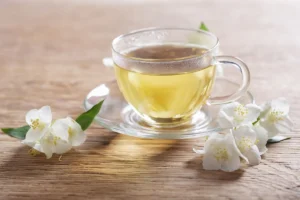Table of Contents
What is Jasmine Tea?
Jasmine tea is a fragrant and flavorful tea made by infusing green tea leaves with jasmine flowers. Originating in China during the Ming dynasty, it has become one of the most popular teas worldwide due to its soothing aroma and numerous health benefits. The tea is typically made from the Camellia sinensis plant, the same plant used for green, black, and oolong teas, and is scented with jasmine flowers from the Jasminum officinale or Jasminum sambac species.
Jasmine tea is known for its light, floral, and slightly sweet taste, making it a refreshing and calming beverage. It is also rich in antioxidants, particularly polyphenols like EGCG (epigallocatechin gallate), which contribute to its health-promoting properties.

Jasmine Tea: Health Benefits, Uses, and How to Make It
Health Benefits of Jasmine Tea
1. Rich in Antioxidants
Jasmine tea is packed with antioxidants, including polyphenols and catechins, which help combat oxidative stress and protect cells from damage. EGCG, a potent antioxidant found in green tea, has been linked to reduced inflammation, improved heart health, and even cancer prevention.
2. Boosts Energy and Focus
Jasmine tea contains a small amount of caffeine, which can enhance alertness and concentration without causing the jitters associated with coffee. It also contains the amino acid L-theanine, which promotes relaxation and mental clarity.
3. Promotes Relaxation
The floral aroma of jasmine tea, attributed to the compound linalool, has calming effects on the nervous system. Studies suggest that inhaling linalool can reduce stress, lower heart rate, and promote relaxation.
4. Supports Weight Management
Research indicates that the EGCG and caffeine in jasmine tea can boost metabolism and support weight loss. A study on mice found that jasmine tea reduced obesity and improved gut health, highlighting its potential for weight management.
5. Protects Against Chronic Diseases
Jasmine tea’s antioxidants may help reduce the risk of chronic diseases, including heart disease, diabetes, and certain cancers. Regular consumption has been associated with improved cardiovascular health and lower blood sugar levels.
6. Enhances Oral Health
The polyphenols in jasmine tea have antibacterial properties that can help prevent tooth decay and gum disease. Studies suggest that incorporating tea extracts into oral care products may improve dental health.
7. Supports Brain Health
The combination of L-theanine, caffeine, and polyphenols in jasmine tea may protect against neurodegenerative diseases like Alzheimer’s and Parkinson’s. These compounds also promote relaxation and better sleep.
How to Make Jasmine Tea
Making jasmine tea at home is simple and allows you to enjoy its full flavor and health benefits. Follow these steps:
- Choose High-Quality Tea: Opt for loose-leaf jasmine tea or jasmine pearls for the best flavor and aroma.
- Heat Water: Use water heated to 160–190°F (70–85°C). Avoid boiling water, as it can destroy delicate antioxidants.
- Steep the Tea: Add 1 teaspoon of loose-leaf tea or 2–3 jasmine pearls per cup of water. Steep for 2–3 minutes.
- Enjoy: Strain the tea and enjoy it plain or with a touch of honey for added sweetness.
Store jasmine tea in a cool, dark place to preserve its freshness and flavor.
Caffeine Content in Jasmine Tea
Jasmine tea contains about 28 milligrams of caffeine per cup, which is less than coffee (95 mg) and black tea (47 mg). The caffeine content can vary depending on the type of tea and steeping time. For those sensitive to caffeine, limiting intake to 2–3 cups per day is recommended.
Risks and Side Effects
While jasmine tea is generally safe, there are a few considerations:
- Caffeine Sensitivity: Individuals sensitive to caffeine should limit their intake to avoid side effects like jitteriness or insomnia.
- Pregnancy and Breastfeeding: Pregnant and breastfeeding women should consume no more than 1–2 cups per day due to caffeine content.
- Stomach Sensitivity: Drinking jasmine tea on an empty stomach may cause discomfort in some individuals. Pair it with a meal to avoid this issue.
Conclusion
Jasmine tea is a delightful and health-promoting beverage that offers a wide range of benefits, from boosting energy and focus to supporting heart and brain health. Its soothing aroma and light, floral flavor make it a perfect addition to your daily routine. For more information on the health benefits of tea, visit Healthline.